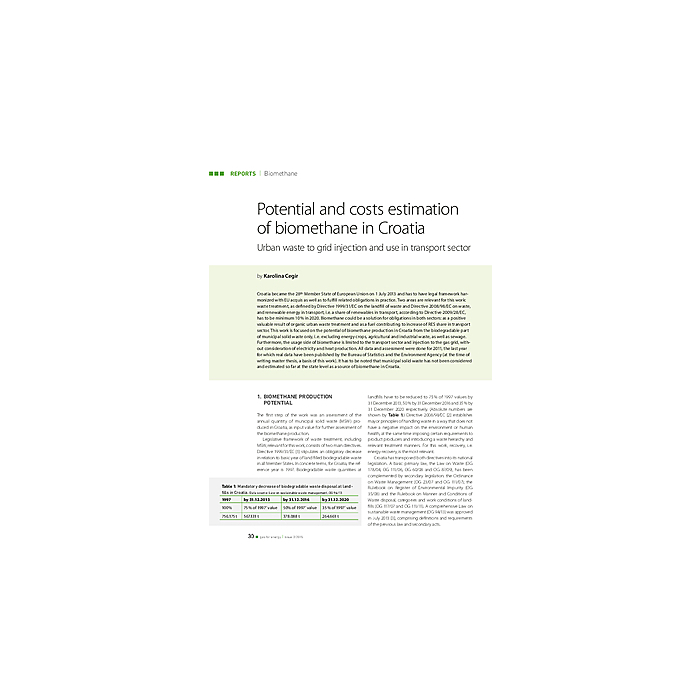Potential and costs estimation of biomethane in Croatia
4,90 €
Auf Lager
Artikelnummer
00258_2015_02_03
Urban waste to grid injection and use in transport sector
Croatia became the 28th Member State of European Union on 1 July 2013 and has to have legal framework harmonized with EU acquis as well as to fulfill related obligations in practice. Two areas are relevant for this work: waste treatment, as defined by Directive 1999/31/EC on the landfill of waste and Directive 2008/98/EC on waste, and renewable energy in transport, i.e. a share of renewables in transport, according to Directive 2009/28/EC, has to be minimum 10 % in 2020. Biomethane could be a solution for obligations in both sectors: as a positive valuable result of organic urban waste treatment and as a fuel contributing to increase of RES share in transport sector. This work is focused on the potential of biomethane production in Croatia from the biodegradable part of municipal solid waste only, i. e. excluding energy crops, agricultural and industrial waste, as well as sewage. Furthermore, the usage side of biomethane is limited to the transport sector and injection to the gas grid, without consideration of electricity and heat production. All data and assessment were done for 2011, the last year for which real data have been published by the Bureau of Statistics and the Environment Agency (at the time of writing master thesis, a basis of this work). It has to be noted that municipal solid waste has not been considered and estimated so far at the state level as a source of biomethane in Croatia.
| Autoren | Karolina Cegir |
|---|---|
| Erscheinungsdatum | 01.02.2015 |
| Format | |
| Zeitschrift | gas for energy - Ausgabe 02 2015 |
| Verlag | DIV Deutscher Industrieverlag GmbH |
| Sprache | English |
| Titel | Potential and costs estimation of biomethane in Croatia |
| Untertitel | Urban waste to grid injection and use in transport sector |
| Beschreibung | Croatia became the 28th Member State of European Union on 1 July 2013 and has to have legal framework harmonized with EU acquis as well as to fulfill related obligations in practice. Two areas are relevant for this work: waste treatment, as defined by Directive 1999/31/EC on the landfill of waste and Directive 2008/98/EC on waste, and renewable energy in transport, i.e. a share of renewables in transport, according to Directive 2009/28/EC, has to be minimum 10 % in 2020. Biomethane could be a solution for obligations in both sectors: as a positive valuable result of organic urban waste treatment and as a fuel contributing to increase of RES share in transport sector. This work is focused on the potential of biomethane production in Croatia from the biodegradable part of municipal solid waste only, i. e. excluding energy crops, agricultural and industrial waste, as well as sewage. Furthermore, the usage side of biomethane is limited to the transport sector and injection to the gas grid, without consideration of electricity and heat production. All data and assessment were done for 2011, the last year for which real data have been published by the Bureau of Statistics and the Environment Agency (at the time of writing master thesis, a basis of this work). It has to be noted that municipal solid waste has not been considered and estimated so far at the state level as a source of biomethane in Croatia. |
Eigene Bewertung schreiben


